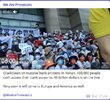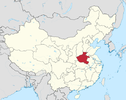Czech Republic: Thousands rally in Prague against pro-Western government
Thousands of people took to the streets in the Czech capital on Friday to protest high prices, for which they blame the center-right government's focus on supporting Ukraine against the Russian invasion.
The organizers of the "Czech Republic first" protest — a nod to former US President Donald Trump's nationalist slogan — are a mixture of various, mostly far-right, fringe groups with pro-Kremlin and anti-vaccine tendencies.
The demonstration took place in Prague's Wenceslas Square and coincided with the October 28 national holiday marking the formation of Czechoslovakia in 1918.
Enemies everywhere but Moscow
Protesters called on Prime Minister Piatr Fiala and his coalition government to resign.
Those present railed against Ukraine, the EU, NATO, the UN and the World Health Organization (WHO), but came out in defense of Russia's war of aggression.
"Russia's not our enemy, the government of warmongers is the enemy,'' one speaker said
"The government we have is the worst in the history of the Czech Republic and I'm not the only one who thinks so," protester Eva Frantova told AFP news agency.
Another, smaller, rally also took place in the country's second-largest city, Brno, but police said the overall number of participants was lower than the 70,000 that were counted at a similar demonstration in early September.
Czech support for Ukraine
Prague, which is currently holding the rotating EU presidency, has been one of Ukraine's staunchest supporters in Europe.
It has sent heavy weaponry and given visas to some 450,000 Ukrainian refugees, granting them access to social services such as health care and financial help.
Fiala and several of his ministers are planning on traveling to Kyiv on Monday.
But the country, like many others, is battling soaring inflation — which reached 18% in September in comparison to the previous year.
"We know who's our friend and who's bleeding for our freedom," Interior Minister Vit Rakusan tweeted in response to the protest. "And we also know who's our enemy."
Protesters have called for the Czech government to resign amid rising prices. Many side with Russia over its invasion of Ukraine and antagonism towards NATO.

www.dw.com

 theinfowar.tv
theinfowar.tv









